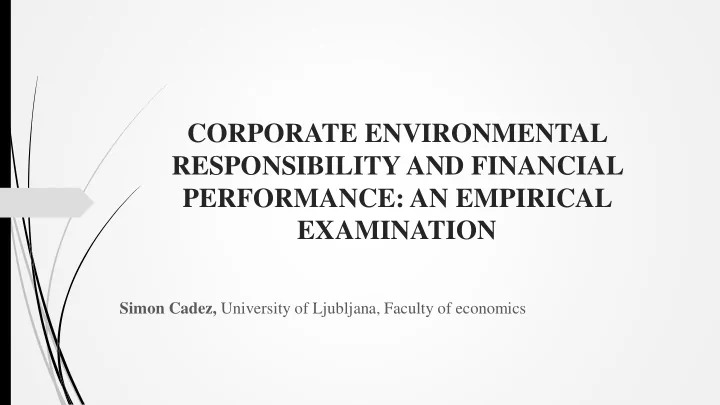

CORPORATE ENVIRONMENTAL RESPONSIBILITY AND FINANCIAL PERFORMANCE: AN EMPIRICAL EXAMINATION Simon Cadez, University of Ljubljana, Faculty of economics
Introduction Corporate environmental responsiblity (CER) is a subtheme of Corporate social responsibility (CSR). CSR is a holistic concept that embodies responsible action towards a variety of stakeholders, e.g.: - customer responsibility - employee responsibility - societal responsibility - environmental responsibility - etc.
Introduction Despite enduring enquiry, the relationship between CSR and financial performance (CFP) remains controversial along three perspectives: Empirical results concerning the nature of the relationship range from positive to negative The causality of the relationship is still unclear. CSR involves appeasing a range of heterogeneous stakeholder groups which evince different potential to affect financial performance. Aim: provide a deeper insight into the reciprocal nature of the CSR-CFP relationship by disentangling the perspectives of time and stakeholder heterogeneity.
Theoretical background Two opposing rationales concerning the CSR – CFP relationship Social impact hypothesis Trade-off hypothesis
… Stakeholder heterogeneity Social impact hypothesis Trade-off hypothesis NGOs Employees Transactional Non-transactional Society Customers stakeholders stakeholders Natural environment Competitors Natural environment Spillover effects: CSR activity towards one stakeholder group can be observed by other stakeholder groups
Conceptual model and hypotheses Overall CSR model Stakeholder group level models
Methodology Triangulation of quantitative and qualitative mathods Quantitative analysis Combination of data collected with questionnaire survey and data from financial statements Sample 124 large and medium sized companies from Croatia Data analysis PLS path modelling Qualitative analysis 6 interviews
Results – overall model ***p<0,01; **p<0,05; *p<0,1
Results – stakeholder group level models Path coefficients and significance Sub-models (stakeholders) Relationship EMP CUS COM NGOs SOC NE CSR → ROE_2017 0,16** 0,17* 0,16* 0,16** 0,15*** 0,22** ROE_2015 → CSR 0,00 0,11 0,02 0,05 0,09 0,02 Size → CSR -0,13*** -0,09 -0,18** 0,11 0,06 0,01 Stakeholder pressure → CSR 0,60*** 0,47*** 0,50*** 0,64*** 0,55*** 0,57*** Leverage → ROE_2017 -0,07 -0,07 -0,08 -0,08 -0,06 -0,05 Innovativeness → ROE_2017 0,02 -0,01 0,01 0,02 0,01 0,00 Legend: CSR: corporate social responsibility, EMP: employees, CUS: customers, SOC: society, COM: competitors, NGOs: non- governmental organizations, NE: natural environment, ROE: return on equity ***p<0,01; **p<0,05; *p<0,1
Additional analyses Alternative model specification construct CFP t-1 (past CFP) is replaced by CFP t (current CFP). RESULTS OVERALL MODEL The path from CFP t to CSR t → statistically significant. RESULTS STAKEHOLDER GROUP LEVEL MODELS Statistically significant positive relationship between CFP t and CSR t for: - employees - customers - society.
Qualitative analysis „ CSR activities do not cause better CFP directly, but indirectly through increased trust of stakeholders (employees, customers, etc .)”. „ More available financial resources (i.e. higher profitability), equals more money for CSR activities “
Discussion and conclusion OVERALL CSR Concerning the time/causality perspective, we detect a positive time lagged effect of overall CSR on CFP in quantitative and qualitative analysis. Equivocal evidence concerning the effect of CFP on overall CSR (time and method wise). STAKEHOLDER HETEROGENEITY Positive time lagged effect of stakeholder group oriented responsibility (Including CER) on CFP observed for all 6 stakeholder groups appraised (spillover effects) Equivocal evidence concerning the effect of CFP on overall CSR (time and method wise). Causality remains unclear.
Recommend
More recommend